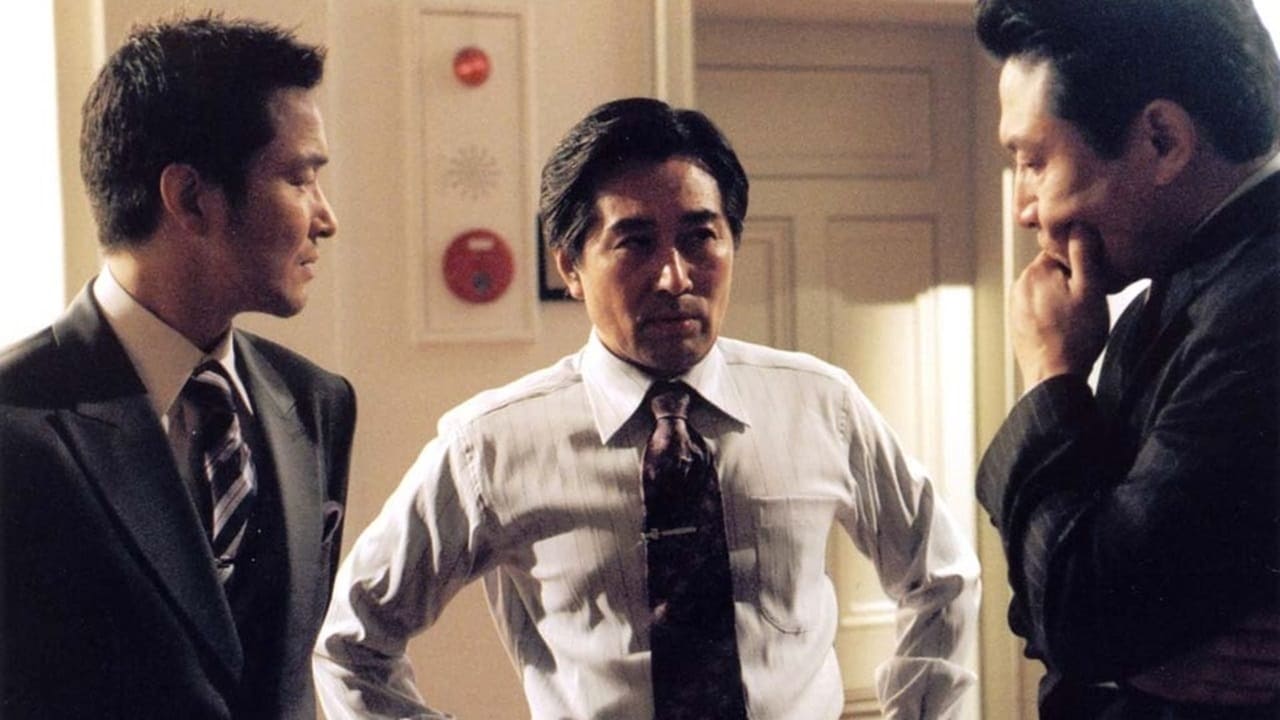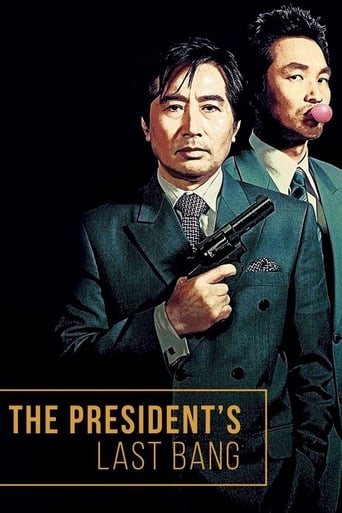Terrell-4
For those who enjoy political conspiracies, especially when laced with matter-of-fact coolness, blood pooling on the floors and enough confusion to make things believable, The President's Last Bang (Geuddae Geusaramdeul) is a fine, odd movie. Nearly all of the film is the story, more-or-less factual, of the last hours of the repressively authoritarian and corrupt Korean President Park Chun-hee, and then the maneuvering that followed. President Park, who seized power in a military coup in 1961, decides to have another of his increasingly frequent private dining evenings with one or two young girls, attended usually by his brutal and sycophantic chief bodyguard, his toadying chief secretary and his watchful head of the Korean Central Intelligence Agency, Kim Jae-Kyu. Fine food is prepared, liquor is poured generously, and the girls entertain and prepare themselves for private entertainment later with the president. We realize the KCIA Director Kim is slowly losing favor. The president makes suggestions to him with a smile or a frown. Kim's compatriots take their cue from the president and make slighting references to the work of the KCIA. Repression is the order of the day, and the KCIA, no pussycat organization as it is, is seen by President Park and his sycophants as not being repressive enough. At the same time Director Kim is losing patience with the president's preoccupation with pleasure. "Never make a big deal about what goes on below the belly button," one high-ranking official advises. The date is October 26, 1979. In the middle of this tipsy, unpleasant party, Director Kim excuses himself for a moment. He tells two trusted subordinates that tonight is the night. This is something they've thought about. Then he takes a revolver in his hand, returns to the party and puts a bullet into the chief bodyguard, then into the President. The lights go out and as Kim's men hear the gunfire, they shoot down most of the remaining bodyguards. Since his gun jammed, Kim takes another gun, returns to the party room, pulls up the president who is still alive and puts a second bullet into the man's head. Then he casually finishes off the groaning chief bodyguard. As his men restore order, Kim tries to gain the Army's support. It doesn't work. The last part of the movie tells us all about how disorderly the highest reaches of government were during the dark, early morning hours after the assassination. Then we learn about the fates of Director Kim and his men. All this is presented with such "I am a camera" directness that the mundane self-interest, the careful protocols of power, the casual corruption and pervasive cynicism of government at these high levels almost turns the movie into a black comedy. For those who believe their sausages are made under the most hygienic conditions and who trustingly never read the list of animal parts that make up the meat, this movie might seem just as foreign as the country it comes from. Unfortunately, no government has captured the market on incompetence, venality, self-interest and rear-end kissing. At first we begin to sympathize with Kim, and then we have to keep remembering the KCIA was just as full of thugs as every other group. Humiliation and beatings were, and may still be, the common currency to maintain discipline and authority. Kim gradually seems motivated more by resentment and irritation than any particular feelings about democracy. How on earth did some of these people achieve power...and then we realize the same question can be asked about all governments. The movie may be something of an oddity, but it's an engrossing one.
seven-iron
great satire. this film isn't necessarily about the assassination of a south Korean president but about the workings of how status works in a political new-world environment circa 1979. Quentin would love this film, i bet. i don't even know for sure what he thinks, but i'm gonna just say it. very funny & a great satire about the simple workings of being human. classic comedy for sure.character development is great & the film is shot very well. no there aren't amazing fight scenes or a lot of sexy Asian nakedness... but just plain old simple character and plot and story. director did a great job. more people should see this for sure....
chivalry_is_dead
I'm-Sang Soo's "President's Last Bang" is an awesome piece of cinema, a throwback to the paranoid political thrillers of the 70s like "The Conversation," "The Parallax View" and "All the President's Men." The film revolves around the true story about an assassination attempt made on President Park Chun-hee and its aftermath.Saw this at Telluride and was blown away by the pitch black comedy, Kim Woo-hyeong's incredible super 35mm cinematography, and the fluid tracking shots.The director described this film as in the vein of "Goodfellas" and the "Godfather" trilogy.For those who are fiending for more quality Korean cinema after "Oldboy," this is definitely worth seeking out.
reeledinburgh
This film is supremely stylish throughout. It informs the viewer about the reputation of the regime, the political pressures from the USA, the fear of attack from the North and the desire to replicate Japan without ever patronising the viewer of shoving it down your throat.The lead performances, particularly that of the KCIA agents, are outstanding. The film exudes style in every shot, from the 'Blue House' as the quintessential VIP 'entertainment venue' to the military fatigues in the army HQ. The cars and suits demonstrate an appreciation of the kind of Hong Kong cinema Tarantino is so fond of plundering.The film's triumph is to never let you sympathise or detest one character too much, that ambiguity allows for the stock of characters to rise and fall as their motives become at the same time clearer and more misguided.Visually arresting with realistic and extreme violence the film is not for the faint hearted.

